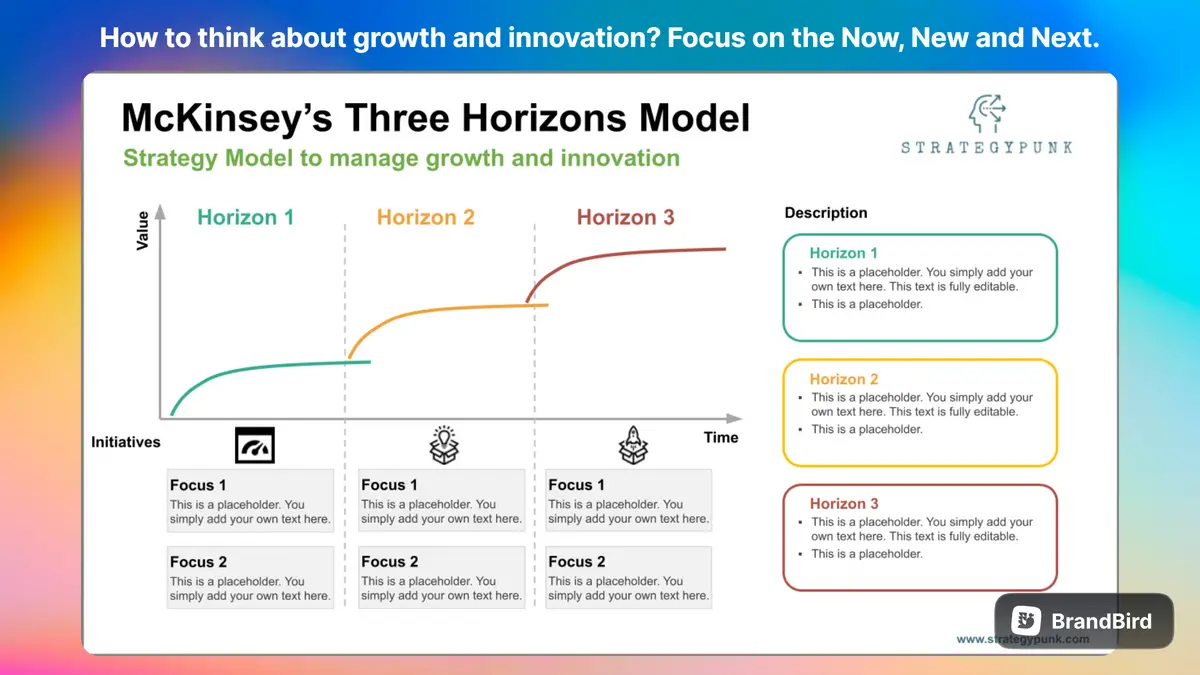Strategic Insights 2024: A SWOT Analysis of Chipotle (Plus Free PPT)
Unlock 2024 Strategic Insights: Comprehensive SWOT Analysis of Chipotle with a Bonus Free PowerPoint Template. Learn more today!
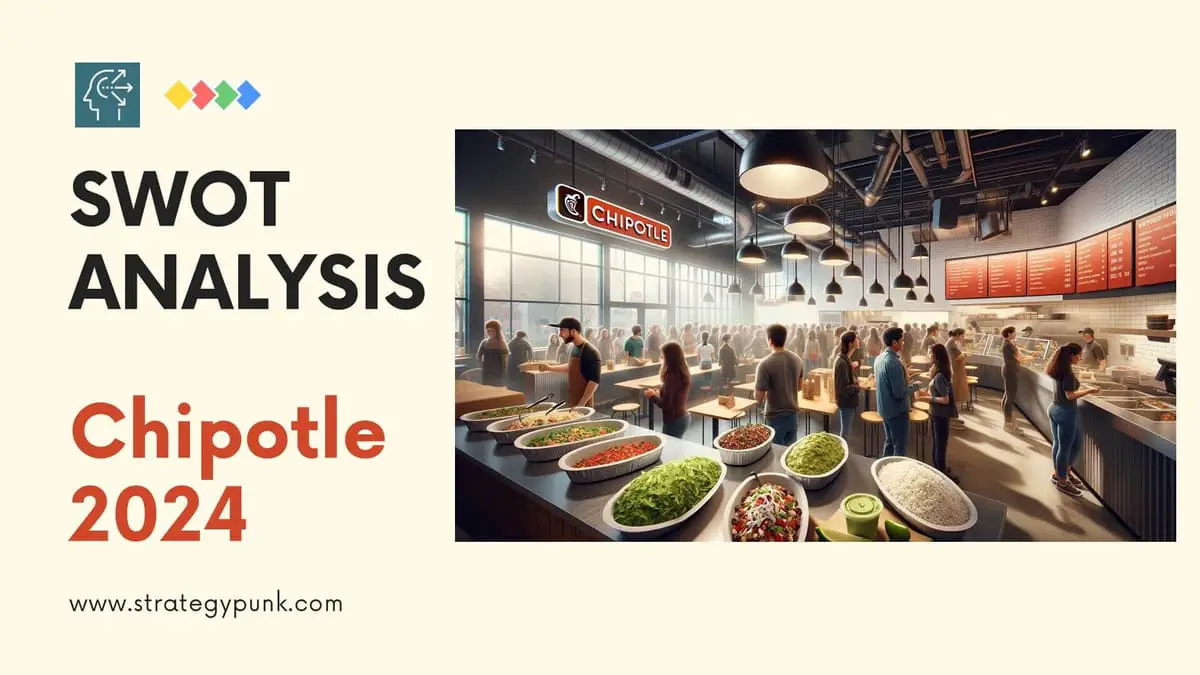
Introduction
The aroma of sizzling fajitas, the satisfying crunch of a perfectly rolled burrito, and the vibrant colors of fresh ingredients meticulously arranged in a bowl—for millions of Americans, these sensory delights are synonymous with one name: Chipotle Mexican Grill.
Since its humble beginnings in 1993, Chipotle Mexican Grill has revolutionized the fast-casual dining industry with its commitment to "Food With Integrity." But as we enter 2024, the restaurant landscape is more competitive and dynamic than ever.
This in-depth SWOT analysis will dissect Chipotle's strengths, weaknesses, opportunities, and threats to uncover the strategic insights that will shape its future. So grab a burrito bowl, settle in, and join us on this flavorful journey into the heart of one of America's most beloved restaurant chains.
Explore Chipotle's strengths, weaknesses, opportunities, and threats with our free PDF and PowerPoint templates. It is designed to offer comprehensive insights for a strategic analysis.
Introduction to Chipotle Mexican Grill
Before we dive into the SWOT analysis, let's set the stage with a brief introduction to Chipotle. Founded by Steve Ells in Denver, Colorado, Chipotle started as a single burrito shop with a simple mission: to serve high-quality, delicious food quickly and affordably.
Ells, a classically trained chef, believed that fast food didn't have to compromise on taste or freshness. He sourced ingredients from local farmers, prepared food using classic cooking techniques, and allowed customers to customize their orders. This innovative approach struck a chord with diners and fueled rapid expansion.
Today, Chipotle Mexican Grill boasts over 3,000 locations across the United States, Canada, the United Kingdom, France, and Germany. Its menu has expanded to include tacos, salads, and quesadillas, but the core philosophy remains the same: "Food With Integrity."
A Brief Look at the History of Chipotle
Chipotle's journey from a single burrito shop to a global brand is a fascinating tale of innovation, resilience, and growth. Here are some key milestones:
- 1993: Steve Ells opens the first Chipotle in Denver, Colorado
- 1998: McDonald's invests in Chipotle, fueling rapid expansion
- 2006: Chipotle goes public on the New York Stock Exchange
- 2015: Food safety incidents tarnish Chipotle's reputation
- 2018: Brian Niccol becomes CEO, ushering in a new era of digital innovation and growth
- 2020: Chipotle weathers the COVID-19 pandemic with a focus on digital sales and delivery
- 2023: Chipotle surpasses 3,000 locations and $10 billion in annual revenue
Chipotle Mexican Grill has faced challenges and controversies throughout its history, from food safety scares to labor disputes. But the company's ability to adapt, innovate, and stay true to its core values has allowed it to weather these storms and emerge stronger.
What is the business model of Chipotle?
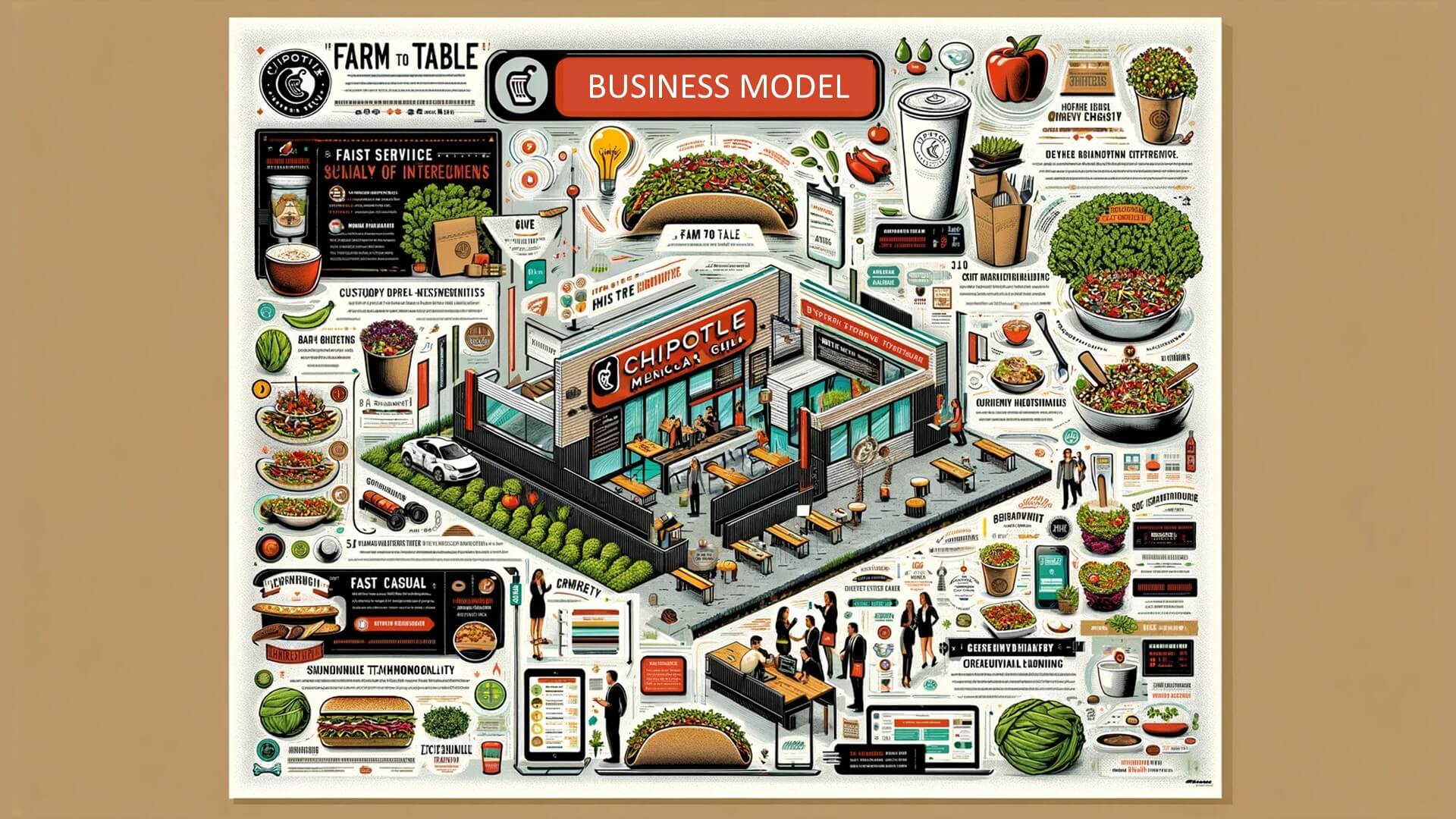
At its core, Chipotle Mexican Grill's business model is built on four key pillars:
- "Food With Integrity": Chipotle sources high-quality, sustainably raised ingredients from local farmers and prepares food using classic cooking techniques. This commitment to freshness and quality sets Chipotle apart from other fast-food chains.
- Customization: Chipotle allows customers to customize their orders, choosing from various proteins, toppings, and salsas. This "build-your-own" approach gives customers control over their meals and caters to different dietary preferences.
- Fast-Casual Dining: Chipotle combines the speed and convenience of fast food with the quality and ambiance of casual dining. Customers order at the counter and receive their food quickly, but the restaurant atmosphere is more upscale than a typical fast-food joint.
- Digital Innovation: In recent years, Chipotle has invested heavily in digital ordering, delivery, and loyalty programs. This focus on technology has allowed Chipotle to reach new customers, increase order frequency, and boost sales.
Chipotle's business model has proven remarkably resilient, allowing the company to weather challenges and continue growing. By staying true to its core values while embracing innovation, Chipotle has carved out a unique niche in the competitive restaurant industry.
Financials of Chipotle 2023
Chipotle's financial performance in 2023 was nothing short of impressive. Despite ongoing challenges posed by the COVID-19 pandemic and supply chain disruptions, the company posted strong results across key metrics:
- Revenue: $9.9 billion, up 14.3% from 2022
- Comparable Restaurant Sales: +7.9%
- Restaurant Level Operating Margin: 26.2%, up 230 basis points from 2022
- Digital Sales: 39.4% of total food and beverage revenue
- New Restaurant Openings: 271, with 238 including a Chipotle
These numbers demonstrate Chipotle's ability to drive growth through menu innovation, digital sales, and new restaurant openings. The company's focus on Chipotlanes, drive-thru lanes dedicated to digital orders, has been particularly successful, with these locations delivering higher sales and margins.
Looking ahead, Chipotle has set ambitious goals for 2024 and beyond. The company plans to open between 285 and 315 new restaurants in 2024, with a long-term goal of operating 7,000 locations in North America. Chipotle also invests in technology and innovation, with plans to test automated kitchen equipment and expand its loyalty program.
With a strong balance sheet, a proven business model, and a pipeline of growth initiatives, Chipotle Mexican Grill is well-positioned to continue delivering value to shareholders in the years ahead. But as we'll see in the SWOT analysis, the company also faces significant challenges and risks that could impact its future performance.
In-depth SWOT Analysis of Chipotle 2024
Now that we've set the stage with an overview of Chipotle's history, business model, and recent financial performance, let's dive into the heart of our analysis: the SWOT analysis.
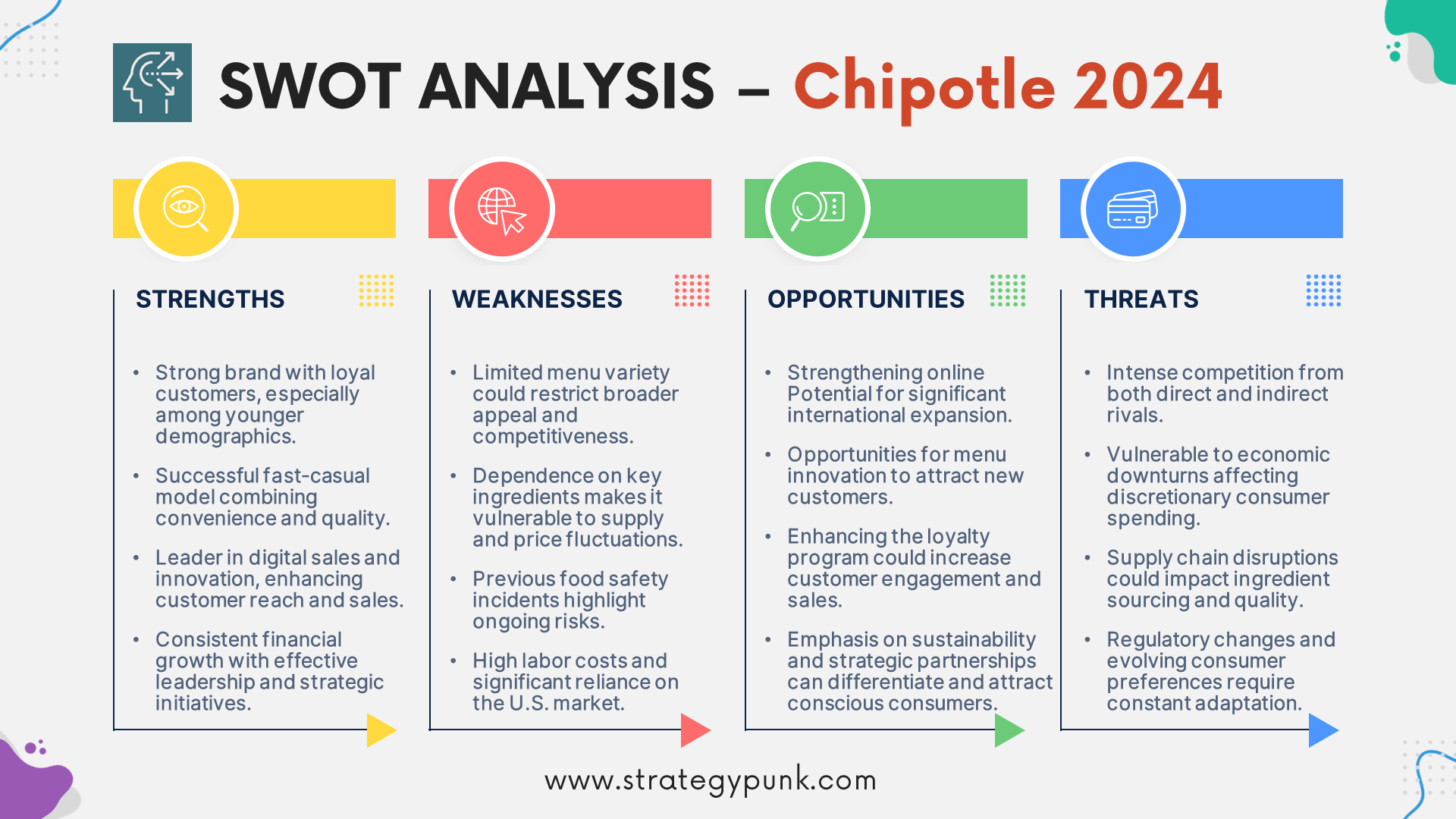
Examining Chipotle Mexican Grill's strengths, weaknesses, opportunities, and threats can provide valuable insights into the company's competitive position and prospects.
Chipotle's Strengths
- Strong brand recognition and loyalty: Chipotle has built a powerful brand that resonates with consumers, particularly millennials and Gen Z. Its commitment to "Food With Integrity" and its unique dining experience have fostered a loyal customer base.
- Proven business model: Chipotle's fast-casual model, which combines the speed of fast food with the quality of casual dining, has proven remarkably successful. The company's focus on customization, freshness, and convenience has allowed it to carve out a profitable niche in the competitive restaurant industry.
- Digital innovation: Chipotle has been a leader in digital ordering and delivery, with digital sales accounting for nearly 40% of total revenue in 2023. The company's investment in technology, including its mobile app and loyalty program, has allowed it to reach new customers and drive incremental sales.
- Strong financial performance: Chipotle has consistently delivered strong financial results despite facing challenges in recent years. The company's revenue, comparable restaurant sales, and margins have all shown impressive growth, demonstrating the resilience and profitability of its business model.
- Experienced leadership team: Under the leadership of CEO Brian Niccol, who joined the company in 2018, Chipotle has undergone a successful turnaround. Niccol and his team have implemented various strategic initiatives, from menu innovation to digital expansion, that have driven growth and positioned the company for long-term success.
Chipotle's Weaknesses
- Limited menu variety: While Chipotle's menu has expanded in recent years, it remains relatively limited compared to other fast-casual chains. This lack of variety could limit the company's appeal to some consumers and make it more vulnerable to competition.
- Reliance on a few key ingredients: Chipotle's menu heavily depends on a few key ingredients, such as avocados and chicken. Disruptions in the supply or price of these ingredients could significantly impact the company's margins and profitability.
- Vulnerability to food safety incidents: Chipotle has experienced several high-profile incidents recently, including outbreaks of E. coli and norovirus. While the company has implemented stringent food safety protocols, the risk of future incidents remains a significant weakness.
- High labor costs: Chipotle relies on a large workforce to prepare and serve its food as a fast-casual chain. Rising labor costs, including minimum wage increases and benefits expenses, could pressure the company's margins.
- Dependence on the U.S. market: While Chipotle has expanded internationally in recent years, most of its restaurants are in the United States. This geographic concentration exposes the company to risks associated with the U.S. economy and consumer spending trends.
Chipotle's Opportunities
- International expansion: With a proven business model and strong brand recognition, Chipotle has significant opportunities to expand internationally. The company has already established a presence in Canada, the United Kingdom, France, and Germany, but there is potential for further growth in these markets and beyond.
- Menu innovation: While Chipotle's menu is relatively limited, the company has shown a willingness to innovate in recent years. Introducing new proteins, such as carne asada and cauliflower rice, has driven incremental sales and attracted new customers. Continued menu innovation could help Chipotle stay relevant and differentiate itself from competitors.
- Expansion of loyalty program: Chipotle's loyalty program, Chipotle Rewards, has been a critical driver of digital sales and customer engagement. By expanding and enhancing the program, Chipotle could increase customer loyalty and frequency.
- Partnerships and collaborations: In recent years, Chipotle has successfully partnered with various brands and influencers, from musicians to athletes to social media personalities. These collaborations have helped the company reach new audiences and generate buzz. Continued partnerships could be a valuable marketing tool for Chipotle.
- Sustainability and social responsibility: As consumers become increasingly conscious of their food choices' environmental and social impact, Chipotle's commitment to sustainability and responsible sourcing could be a key differentiator. By doubling down on these values and communicating them effectively, Chipotle could appeal to a growing segment of socially conscious consumers.
Chipotle's Threats
- Intense competition: The fast-casual dining industry is highly competitive, with a range of established players and new entrants vying for market share. Chipotle faces competition from direct rivals like Qdoba and Moe's and indirect competitors like Panera Bread and Sweetgreen. This intense competition could put pressure on Chipotle's sales and margins.
- Economic downturns: Restaurants are particularly vulnerable as a discretionary consumer spending category. In the event of a recession or slowdown in consumer spending, Chipotle could see a decline in sales and profitability.
- Supply chain disruptions: Chipotle's reliance on fresh, high-quality ingredients makes it vulnerable to disruptions in its supply chain. Weather events, transportation issues, or supplier problems could all impact the company's ability to source critical ingredients and maintain its "Food With Integrity" standards.
- Changing consumer preferences: Consumer tastes and preferences constantly evolve, and Chipotle must stay attuned to these changes to remain relevant. For example, the rise of plant-based diets could pose a challenge for a company known for its meat-centric menu. Chipotle must continue innovating and adapting to stay ahead of changing consumer trends.
- Regulatory risks: As a large, high-profile restaurant chain, Chipotle is subject to various regulatory risks, from food safety regulations to labor laws to environmental standards. Changes in these regulations or failure to comply with them could significantly impact the company's operations and profitability.
Chipotle Mexican Grill SWOT Analysis Summary
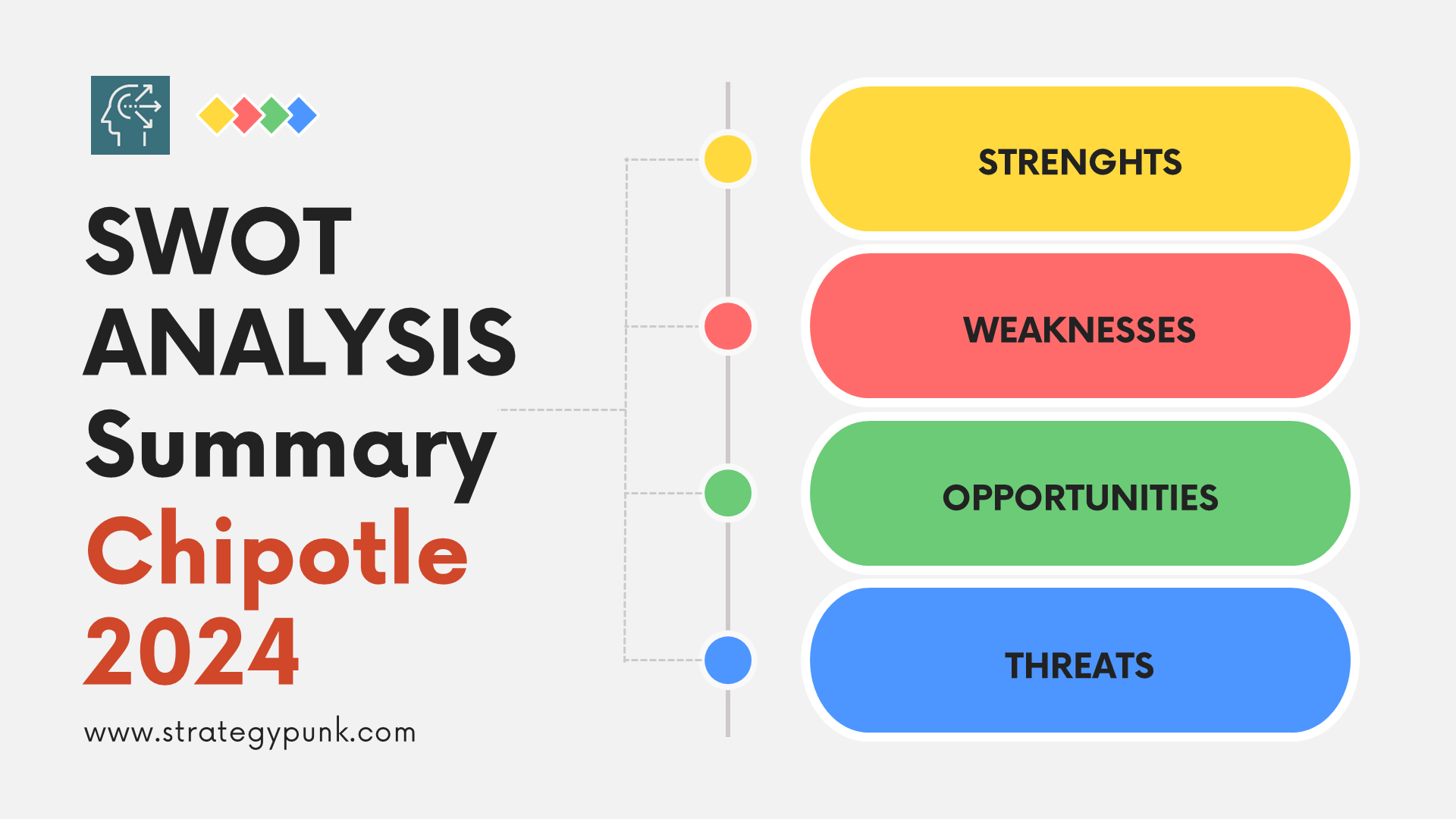
Internal Factors
Strengths:
- Strong brand recognition and loyalty
- Proven business model
- Digital innovation
- Strong financial performance
- Experienced leadership team
Weaknesses:
- Limited menu variety
- Reliance on a few key ingredients
- Vulnerability to food safety incidents
- High labor costs
- Dependence on the U.S. market
External Factors
Opportunities:
- International expansion
- Menu innovation
- Expansion of loyalty program
- Partnerships and collaborations
- Sustainability and social responsibility
Threats:
- Intense competition
- Economic downturns
- Supply chain disruptions
- Changing consumer preferences
- Regulatory risks
Chipotle's Strategies for Success
based on Chipotle's SWOT Analysis
Here are some key strategies Chipotle can employ for continued success in 2024 and beyond:
- Accelerate new restaurant openings, especially Chipotle. Chipotle believes it can operate at least 7,000 restaurants in North America in the long term, up from around 3,000 currently. It plans to open 8-10% new units annually, with over 80% including a Chipotle drive-thru. Chipotle generates 15% higher sales on average. Expanding into smaller towns with favorable economics will fuel growth.
- Continue menu innovation to drive sales. Recent successful launches like cauliflower rice, quesadillas, and smoked brisket attracted new customers and increased check sizes. Upcoming items like pollo asado will keep the menu fresh and relevant. A robust pipeline of crave-able, operationally simple items can boost transactions.
- Enhance digital access and engagement. With digital sales now 40% of revenue, Chipotle must optimize its app, loyalty program, delivery partnerships, and Chipotlanes. Personalized offers to its 30 million rewards members will increase frequency. Making pickup and delivery fast and convenient across channels is vital.
- Amplify brand marketing and cultural relevance. Creative marketing on new platforms like TikTok has made Chipotle a leading brand. Challenges, influencer tie-ins, and timely content keep Chipotle at the forefront of younger consumers' minds. Communicating its Food With Integrity values around sustainability and responsibility can broaden its appeal.
- Maintain operational excellence and innovate. At its core, Chipotle must execute consistently in its restaurants. Investments in employee training, food safety protocols, and kitchen technology will enable excellent throughput and hospitality. Exploring automation and alternative formats can enhance efficiency.
- Expand globally in a disciplined way. While still heavily U.S.-focused, Chipotle has a proven model for expanding internationally. Entering and scaling in new markets like Canada, the U.K., France, and Germany provides another vector of growth as long as supply chains and consumer tastes are well-understood.
By opening more convenient access points, innovating its menu and marketing, doubling down on digital, and running great restaurants, Chipotle can drive robust growth in the years ahead.
Management's focus on a solid culture and building an organization with top talent will be an essential foundation for executing these strategies at scale. With multiple levers to pull, Chipotle has a bright future.
Frequently Asked Questions on Chipotle Mexican Grill
What are Chipotle's biggest strengths contributing to its success and popularity?
Chipotle's key strengths include its strong brand built on "Food With Integrity," using high-quality, fresh ingredients from sustainable sources. Its customizable menu, allowing customers to create burritos, bowls, tacos, and salads that fit their tastes, has been a significant draw.
Chipotle has a robust digital ecosystem across its app, rewards program, and delivery partnerships, driving customer loyalty and engagement. The company's compelling unit economics, with high sales volumes and margins, have enabled rapid expansion. Its unique culture and workforce development create excellent hospitality. All these strengths have made Chipotle a category leader.
What weaknesses or challenges has Chipotle faced, such as food safety issues, and how has it worked to address them?
Chipotle faced significant food safety challenges in 2015, with multiple outbreaks of E. coli, salmonella, and norovirus linked to its restaurants. Over 1,100 people got sick, and the company faced lawsuits, plummeting sales, and a damaged reputation. Chipotle had to close stores, conduct intense cleanings, and retrain all employees on food safety.
Since then, Chipotle has wholly overhauled its food prep and safety protocols, implementing industry-leading practices. It changed food prep procedures, like blanching produce and using central kitchens for some cooking. Sick policy, handwashing, and cleaning measures were all strengthened. Chipotle also started food safety advisory councils with external experts to guide its practices. While it was difficult, Chipotle has bounced back and continues prioritizing safety.
What opportunities can Chipotle explore for future growth?
Opportunities include expanding into international markets, embracing digital orders and partnerships with delivery services, introducing healthier menu options, and leveraging its drive-through option, Chipotlane, for enhanced customer convenience.
How has Chipotle leveraged digital innovation and technology, like its mobile app and loyalty program, to drive sales and engage customers?
Digital innovation has been a massive unlock for Chipotle in recent years. Its mobile app and website allow customers to easily customize orders, save their favorites, and earn rewards. With over 30 million members, the Chipotle Rewards loyalty program enables targeted promotions that boost frequency.
Chipotle has also rolled out in-store tech like digital make lines and pickup shelves to handle online orders efficiently. Its partnerships with primary third-party delivery services like DoorDash and Uber Eats have expanded access. During COVID, digital sales exploded to over 40% of revenue and have remained sticky. Chipotle's digital ecosystem creates a flywheel effect, collecting customer data to inform personalized marketing that drives more digital usage.
How has CEO Brian Niccol's leadership since 2018 helped turn Chipotle's business around after food safety scandals damaged its reputation?
Brian Niccol has been instrumental in Chipotle's resurgence since becoming CEO in 2018. He joined Taco Bell, where he was a digital and marketing innovator, and brought that mindset to Chipotle. Niccol led the development of Chipotle's app, loyalty program, and delivery partnerships to drive engagement.
He's also focused heavily on menu innovation, regularly introducing highly successful new items and promotions to boost sales. Equally significantly, Niccol has strengthened Chipotle's food safety protocols and culture, hiring top experts and implementing stringent procedures to regain trust. His people-first leadership style and investment in employee benefits have improved retention. All these moves have driven record sales and a soaring stock price.
How does Chipotle's business model and focus on customization, digital sales, and a limited menu compare to fast-casual competitors like Panera or Qdoba?
Chipotle's business model shares critical similarities and differences with its fast-casual peers. Like Chipotle, Qdoba and Moe's Southwest Grill focus on customizable burritos, bowls, and tacos with fresh ingredients. However, Chipotle's commitment to "Food With Integrity" and lack of artificial additives are distinctive.
Compared to Panera, Chipotle has a much more limited menu without the breadth of sandwiches, soups, and baked goods. However, this has benefits in terms of operational simplicity and throughput. All these chains have prioritized digital sales, though Chipotle has been an innovator with Chipotlanes and its loyalty program. Chipotle's unit economies are robust, with industry-leading average unit volumes of over $2.5 million.
What makes Chipotle's business model unique in the fast-casual industry?
Chipotle stands out for its "Food with Integrity" philosophy, emphasizing fresh, high-quality ingredients, a simple menu that allows for customization, and a focus on sustainable and responsibly sourced meats
How does Chipotle plan to address its over-reliance on the US market?
Expanding its presence in international markets is seen as a significant opportunity for Chipotle, given that a vast majority of its restaurants are located in the US, making it vulnerable to North American market fluctuations
How does Chipotle manage food safety after past incidents?
Despite past food safety issues, Chipotle has implemented stringent food safety protocols and made efforts to ensure the quality and safety of its ingredients, although managing this remains a challenge
How has Chipotle's digital strategy contributed to its success?
Chipotle's digital strategy, including a user-friendly app and partnerships with third-party delivery services, has significantly increased its revenue, especially during the pandemic, making digital sales a substantial portion of its total revenue
Chipotle SWOT Analysis PowerPoint Template
free and fully editable PPT template
A SWOT analysis evaluates the strengths, weaknesses, opportunities, and threats impacting a company.
This free editable PowerPoint template provides a SWOT analysis framework to evaluate Chipotle's internal strengths and weaknesses and external opportunities and threats.
Chipotle SWOT Analysis PDF Template
Chipotle SWOT Analysis PowerPoint Template
Feel free to customize the template by adding your content, images, and visuals.
Discover more
New! SWOT Framework & Free PPT Template - 2024 Edition
Dive into the 2024 Edition of our SWOT Analysis guide, complete with a free PowerPoint template. This resource covers the essentials of conducting a SWOT analysis, its benefits, and practical application tips, including a case study on Mercedes Benz.
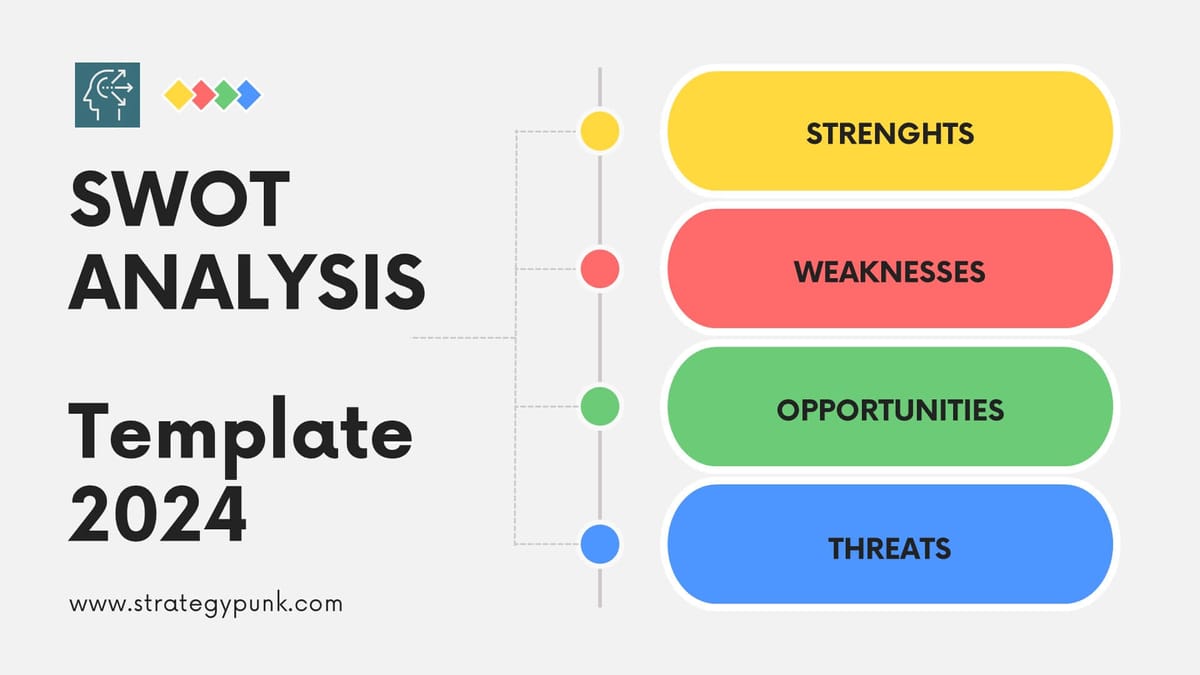
Strategic Insights 2024: A SWOT Analysis of Adidas (Free PPT)
Explore 'Strategic Insights 2024: A SWOT Analysis of Adidas' with our free PowerPoint template. Dive deep into Adidas' strengths, weaknesses, opportunities, and threats in 2024. Download now for insightful strategy planning!

McKinsey Pyramid Principle: The Ultimate Guide to Effective Arguments
The McKinsey Pyramid Principle is pivotal in structuring arguments, making data understandable, and driving informed decisions in fast-paced business environments. This methodology uses a top-down approach to ensure concise, logical, and impactful presentations.
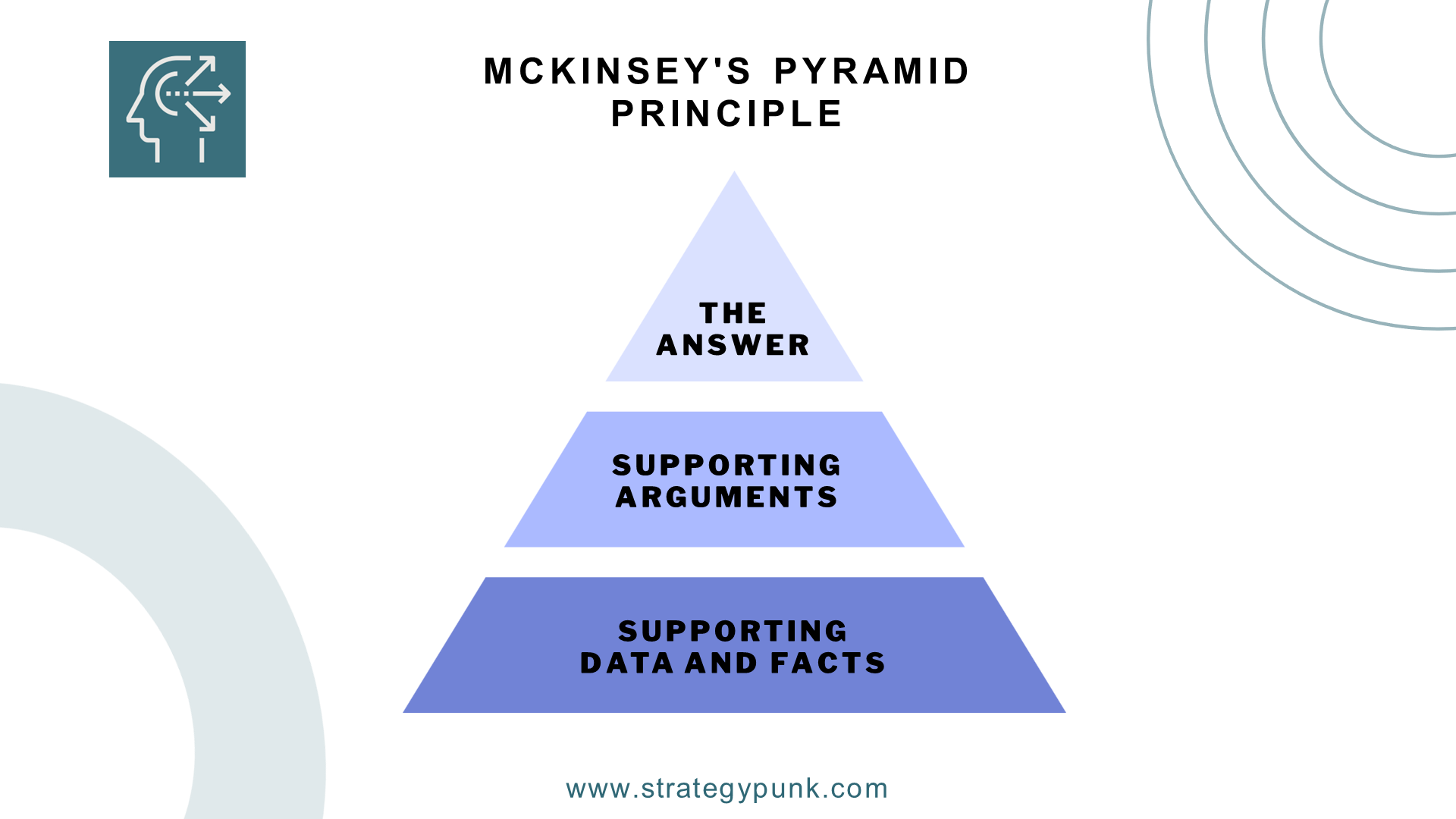
McKinsey's 3 Horizons Framework: Free PowerPoint Template
How do you think about growth and innovation? Focus on the Now, New, and Next. Free slide deck in PowerPoint and Google Slides format.
